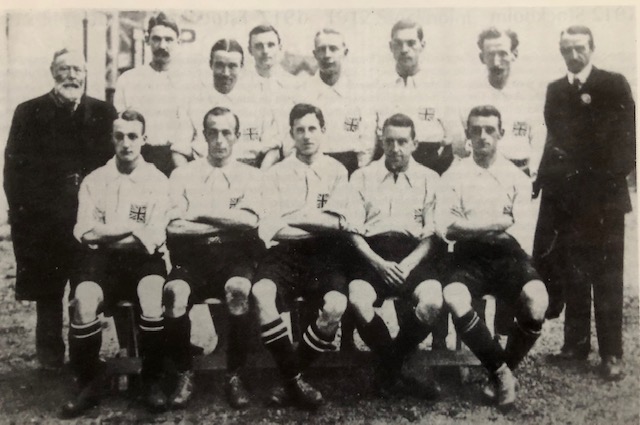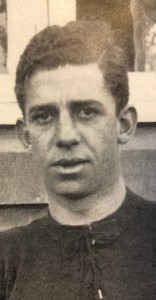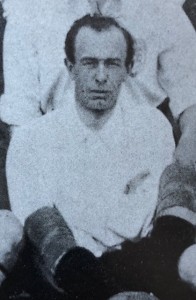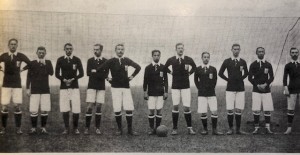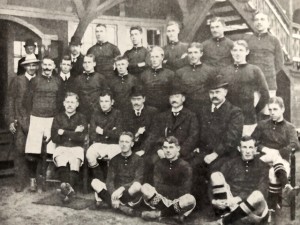OLYMPIC FOOTBALL TOURNAMENT 1908
Picture : Olympic champion 1908 – Great Britain. Standing from left : Arthur Kinneird (FA), Kenny Hunt, Walter Corbett, Herbert Smith, Horace Bailey, “Fred” Chapman, “Bobby” Hawkes, F.Davis (FA). Down from left : Arthur Berry, “Harry” Stapley, Vivian Woodward, Claude Purple, Harold Hardman.
—————————————————————————————————————————–
1908 – London
—————————————————————————————————————by IFFHS—
Pierre de Coubertin had wanted the Olympic Games in 1908 to take place in Rome. However, preparatory work was slow and not up to the standards of the IOC. Thus, in the absence of Baron Pierre de Coubertin, the IOC members decided to move the games to London, although this was only made public in November 1906. The “British Olympic Council” did a good organising job and also built a large multi-purpose stadium.
The Olympic Games, held in London from April 27 to October 31, 1908, were contested in 27 disciplines, some of which were, again, only demonstration in character. There were athletes from 25 countries, with the British countries (England, Scotland, Wales and Ireland) participating together under the name “Great Britain”. Australia and New Zealand also fielded a joint team. The boxing, football, hockey, lacrosse, rugby and figure skating tournaments took place in the second half of October, the other competitions having ended in August.
These were the first games with a real Olympic football tournament. The support of the Foorball Association (FA) and of FIFA president Daniel Burley Woolfall (1852-1918), who was English, were instrumental. Not only was England seen as the mother country of modern football, she also was set the example for every other country in the world where football was concerned. Thus, every national football association in Europe was emphatically asked to send its national team to the Olympics.
Even so, in addition to hosts Great Britain, only seven countries – Bohemia, Denmark, France, Hungary, Sweden and the Netherlands – entered, and so the organisers were not unhappy with France sending two national teams. The draw for the quarter-finals had already been made on October 2, 1908, when the Austrian-Hungarian monarchy decided to bar Bohemia and Hungary from fielding their own national football teams at the Olympics.
Bohemia (Čechy) still had played an official full “A” international against Hungary in Budapest in April 1908, and another against England in Prague in June 1908, before due to political changes by the Austrian-Hungarian monarchy caused Bohemia to lose its FIFA membership. As Regarding for Hungary and the Austrian-Hungarian monarchy, it was for purely political reasons, as the “Magyars” had become great rivals of the Austrians on mainland Europe, and their national team already had caused a sensation in1902. Thus the Netherlands and France, who had been drawn to play Hungary and Bohemia respectively, received a bye to the semi-finals.
French football had been in a curious situation ever since 1908. The hitherto leading body, the “Union des Sociétés Françaises des Sports Athlétiques” (USFSA), had left FIFA in July 1908, but still was recognised by the IOC. However, the “Comité Français Interfédéral” (CFI), which was founded in March 1907, was not officially recognised by FIFA as the successor to the USFSA until December 1908. In the end, 41 players were tested, and after several of them declined to participate, the French decided that their two teams should be equally strong.
The Olympic football tournament went as expected, at least regarding the sporting aspect, although Denmark beat France in the semi-finals with a surprisingly high – indeed, record – score. Attendance, on the other hand, was shockingly low compared to the gate numbers normally registered at matches in the top two English divisions. All matches were played in the White City Stadium (located in Shepherds Bush), which was originally just called “The Stadium”.
OLYMPIC TOURNAMENT 1908 LONDON
QUARTER FINALS
19 October 1908 : DENMARK – FRANCE 9 – 0 (4-0)
White City Stadion London, 2000 spectators, Referee : Thomas Kyle (England).
Goals for Denmark : Nils Middelboe (10’ and 47’), Vilhelm Wolfhagen (15’, 25’, 72’ and 78’), Harald Bohr (17’and 49’), Sophus Erhard Nielsen (67’).
Denmark’s Olympic debut also was their first full international, whereas for the French it was their 11th full international match. Even though the Danes were the favourites, their clear domination on the pitch and the high scoreline did surprise. In all fairness, il should be mentioned that the French had only left Paris at 7PM on the previos day, crossed the channel by ship and then travelled to London by train, where they arrived dead tired two hours before kick-off ! The Danish team had been preparing in London for two weeks prior the beginning of the tournament.
18 year old left footed Vilhelm Wolfhagen scored four goals in the first Olympic football match in history !
20 october 1908 : GREAT BRITAIN – SWEDEN 12 – 1 (7-0)
White City Stadion London. 2000 spectators. Referee : John T. Ibbotson (England). Goals for Great Britain : Harold S. Stapley (2), Vivian John Woodward (2),Arthur Berry (1), Frederik William Chapman (1), Claude Victor Purnell (4), Robert Murray Hawkes (2). For Sweden : Gustav Bergström (1).
Six weeks before in Göteborg, the Swedes already had lost a full international 1-6 to the English amataeurs and the team at their olympic debut was the same except one player. The british Olympic team consisted entirely of English players, five of which had not played in Göteborg. The british who counted on a formidable attack played a very solid game and inflicted on the Swedes their highest defeat ever. Thre sportcasters were so fascinated by the british game that they forgot to record the minutes of the goals !
English center forward “Harry” Stapley .
SEMI-FINALS
22 october 1908 : DENMARK – FRANCE 17 – 1 (6-1)
White City Stadion London. 1000 spectators. Referee : Thomas P.Campbell (England). Goals for Denmark : Sophus Erhard Nielsen (3’, 4’, 6’, 39’, 46’, 48’, 52’, 64’, 66’, 76’), August Ludvig Lindgren (18’, 37’), Vilhelm Wolfhagen (60’, 72’, 82’, 89’), Nils Middelboe (68’). For France : Emile Sartorius (16’).
The Danes with two new wingers were in great disposition. The French national side ,which was with equal to the other team the Danes had eliminated in the quarter finals, also counted six newcomers, but was considered the stronger side by the French. The French suffered a crushing defeat also because their stamina gave out in the second half. It was the highest loss in France’s history, while the Danes won their highest victory ever. The French were so schocked after these embarrassing defeats that they declined to play for the bronze medal. Not only had the Danes reached the Olympic final, their centre forward Sophus Nielsen had also established three World records in one match : the fastest hat and quadra trick as well as the most goals scored by one player in a full international match. These also were Olympic records.
Sophus Erhard Nielsen : 10 goals in one international match, WORLD RECORD !
22 october 1908 : GREAT BRITAIN – NETHERLANDS 4 – 0 (1-0)
White City Stadion London. 6000 spectators. Referee : John Thomas Howcroft (England). Goals for England : Harold S. Stapley (37’, 60’, 64’, 75’).
The Dutch, who fielded three newcomers at their Olympic debut, had an outstanding goalkeeper in Reinier Beeuwkes and with Bok de Korver one of the best centre half backs on the European mainland. The Orangemen were also coached and well prepared by English ex-professional and former international player Edgar Chadwick. Thus, the men from the continent successfully resisted the British for a good half hour. In the end, the British were far superior to and had the better stamina. Their centre forward Harold Stapley, perfectly supported by his team-mates, scored all four goals. The favourites easily reached the final.
Olympic Bronze medal for Netherlands 1908
PLAY-OFF – THIRD PLACE
23 october 1908 : NETHERLANDS – SWEDEN 2 – 0 (1-0)
White City Stadion London. 1000 spectators. Referee : John Hargreaves Pearson (England). Goals for Netherlands : Gerard Simon Reeman (6’), Everardus Snethlage (58’)
After the French had forfeited, the Netherlands played Sweden for third place. The Orangemen had only made one change, introducing newcomer Jan Kok into the line-up. Both teams gave good battle and following their early lead, the Dutch left the White City Stadion as winners to receive a well deserved bronze medal. It was crucial that, prior to the 2-0, Reinier Beeuwkes held a swedish penalty.
Denmark runner-up in London 1908
FINAL
24 october 1908 : GREAT BRITAIN – DENMARK 2 – 0 (1-0)
White City Stadion London. 8000 spectators. Referee : John Lewis (England). Goals for Great Britain : Frederick William Chapman (20’), Vivian John Woodward (46’).
The Olympic final was contested by the British and the Danes, the latter again fielding Oskar Nielsen as outside right, while the British fielded the same exact team they had during their previous two matches. The Danes, coached by English referee Charles Williams, attacked the British early, played a fast and agressive game, and were in good physical shape. It was the first time that the famous British defenders Walter Corbett and Herbert Smith saw real action. Also Danish goalkeeper Ludvig Dresher was not entirely without fault with the first British goal, he hold many others brilliantly. The all-star British Olympic team , with outstanding playmaker Vivian Woodward, scored shortly after the change of ends, and was well on the road to victory. In the second half, the Danes stepped up their game and repeatedly troubled Horace Bailey in goal, who kept masterfully. At the end of the game, Great Britain had deserved their win, the Danes had proven that theirs was the strongest team on the European mainland. They provided also the top scorer of the tournament, Sophus Erhard Nielsen.
